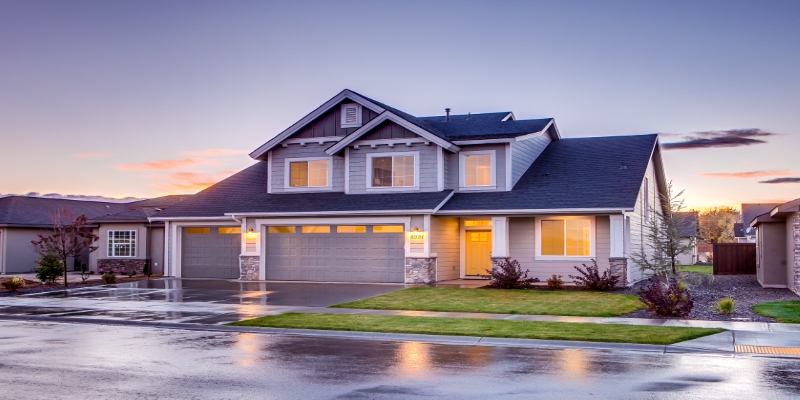Fortify Your Home: 4 Must-Know Tips for Property Security
Nov 21, 2023 By Triston Martin
Securing your property is a crucial step in ensuring peace of mind and safeguarding your assets. Whether you own a home, a business, or both, understanding the essentials of property protection is vital. In this article, we'll delve into four key things you must know when planning your property protection. Let's make the journey of safeguarding your investments a breeze.
Assessing Vulnerabilities: A Proactive Approach
When it comes to property protection, taking a proactive stance is paramount. Start by identifying potential vulnerabilities in and around your property. Conduct a thorough assessment of weak points such as faulty locks, broken windows, or poorly lit areas.
This not only helps in understanding potential entry points for intruders but also highlights areas where accidents or natural disasters could cause damage.
Identifying Weak Points
Begin by inspecting all entry points, including doors, windows, and any other access areas. Make sure all locks are in proper working condition, and consider upgrading to more secure options if necessary.
Lighting Matters
Proper lighting is a deterrent for potential intruders. Install motion-activated lights in strategic areas to discourage unwanted visitors and enhance the overall safety of your property.
Assessing Natural Disaster Risks
Consider the geographical location of your property and the potential risks it may face, such as floods, earthquakes, or wildfires. Taking preventive measures, such as reinforcing structures or purchasing insurance, can go a long way in mitigating these risks.
Investing in a Reliable Security System
One of the most effective ways to protect your property is by investing in a reliable security system. Today, there are various options available, ranging from basic alarm systems to advanced smart home security solutions. Choosing the right system for your needs is crucial.

Understanding Your Security Needs
Tailoring your security measures to the unique requirements of your property is crucial. Begin by conducting a comprehensive evaluation of your security needs. In a residential setting, a combination of door and window sensors, complemented by a monitored alarm system, might be adequate.
However, businesses may require a more sophisticated approach, incorporating CCTV cameras, access control systems, and around-the-clock monitoring services. By understanding your specific security needs, you can design a system that provides optimal protection for your property.
Smart Home Integration
Consider opting for a security system that integrates with smart home technology. This allows you to monitor and control your security settings remotely, providing an added layer of convenience and peace of mind.
Professional Installation vs. DIY
While many security systems offer DIY installation options, professional installation ensures that the system is set up correctly and is functioning optimally. It also provides an opportunity for professionals to offer advice on optimal sensor placement and system customization.
Building a Strong Relationship with Your Community
Community engagement plays a vital role in property protection. Establishing a strong relationship with your neighbors and local law enforcement can significantly contribute to the safety of your property.
Neighborhood Watch Programs
Participating in or initiating a neighborhood watch program is a proactive step toward enhancing community security. These programs foster a sense of community among residents and encourage mutual vigilance.
By promoting regular communication about suspicious activities, neighborhood watch programs play a crucial role in preventing crimes and collectively improving the overall security of the community.
Collaboration with Local Authorities
Building a positive relationship with local law enforcement is key to community safety. Attend community meetings, actively participate in crime prevention initiatives, and communicate any security concerns to the authorities.
This collaborative approach not only strengthens community-police relations but also ensures a faster response in case of emergencies, contributing to overall neighborhood security.
Emergency Response Plans
Collaborate with your community and local authorities to create and communicate emergency response plans. Whether addressing a break-in, a fire, or a natural disaster, having a well-defined plan ensures a coordinated and effective response. Regular drills and updates to the plan will help keep everyone prepared for any unforeseen events.
Regular Maintenance and Updates
Property protection is not a one-time task; it requires ongoing attention and maintenance. Regularly updating your security measures and addressing potential issues ensures that your property remains secure over time.

Routine Checks and Maintenance
To uphold the effectiveness of your security system, establish a routine for regular checks and maintenance. This includes scheduled inspections to identify and address any malfunctions promptly. Change batteries in sensors and cameras as needed to ensure uninterrupted functionality.
Additionally, stay vigilant about updating all components to the latest firmware to enhance the security system's overall performance and resilience. Regular maintenance safeguards your system's reliability, providing continuous protection for your property.
Keeping Up with Technological Advances
In the dynamic landscape of security, technological advancements play a crucial role in staying ahead of potential threats. Regularly update yourself on the latest innovations in security technology to ensure your system remains robust and effective.
This proactive approach may involve installing software updates, upgrading hardware components, or adopting new security features. By staying current with technological advances, you enhance the overall resilience of your security system and fortify your defense against evolving security challenges.
Reassessing Risks and Security Measures
Regularly reassessing the risks to your property and evaluating the effectiveness of your security measures is a fundamental aspect of maintaining a robust security system. Environmental changes, such as nearby construction or alterations to neighboring properties, can influence the security needs of your premises.
By staying vigilant and adapting your security measures to evolving circumstances, you ensure that your security system remains optimized and responsive to potential threats.
Conclusion
Protecting your property is a multifaceted endeavor that requires careful consideration and ongoing effort. By taking a proactive approach, investing in a reliable security system, building community relationships, and maintaining your security measures, you can create a robust and effective property protection plan.
Stay vigilant, stay informed, and take the necessary steps to safeguard your home or business. After all, a secure property is a foundation for a secure and peaceful life.









 smartgridinfo
smartgridinfo